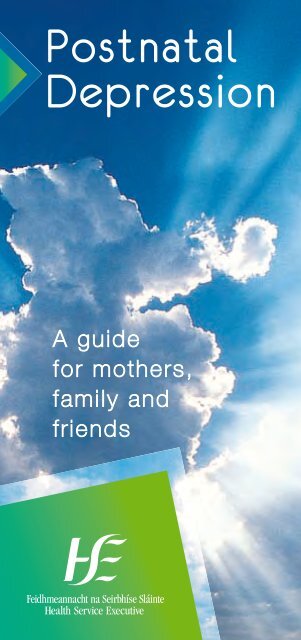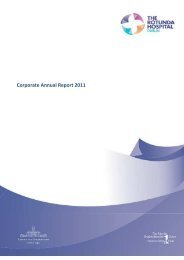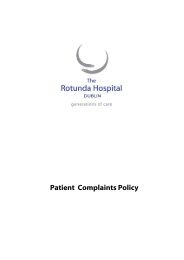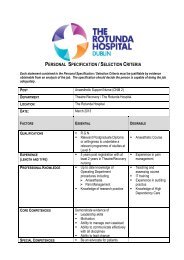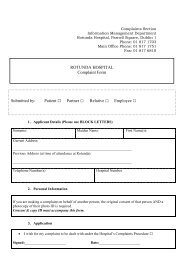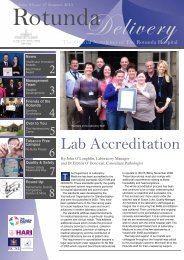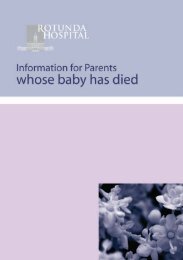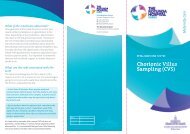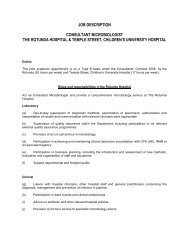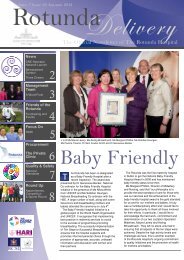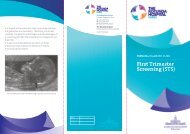Postnatal Depression - Health Service Executive
Postnatal Depression - Health Service Executive
Postnatal Depression - Health Service Executive
- No tags were found...
Create successful ePaper yourself
Turn your PDF publications into a flip-book with our unique Google optimized e-Paper software.
<strong>Postnatal</strong><strong>Depression</strong>A guidefor mothers,family andfriends
<strong>Postnatal</strong> <strong>Depression</strong>What is it?What is it?After giving birth, most mothersexperience some degree ofmood swings. There are threemain kinds of postnatal moodchange:» Baby blues» Puerperal psychosis» <strong>Postnatal</strong> depression» Baby bluesThe ‘baby blues’ are so common they areconsidered normal for new mothers. Theyusually begin 2 - 4 days after your baby isborn. You may have crying spells, increasedfeelings of vulnerability, irritability, lonelinessand weariness. Although you may find itdistressing, the baby blues will pass quickly,usually within a few weeks, with supportfrom your partner, family and friends.» Puerperal psychosisPuerperal psychosis is the most extreme,and rarest, form of postnatal mood change.It affects 1 in 500 new mothers. Puerperal»means the six weeks after childbirth andpsychosis is any form of mental illnessin which you lose contact with reality.Symptoms begin soon after the birth, usuallywith the mother becoming restless, mildlyconfused and unable to sleep. This form ofdepression usually requires hospital care.<strong>Postnatal</strong> depression<strong>Postnatal</strong> depression falls somewherebetween the baby blues and puerperalpsychosis. It may affect up to 1 in 6 newmothers, although some experts believe itaffects more than this. Symptoms maystart as baby blues and then get worse,or they may take some time to develop.It may be most obvious when your baby is4 - 6 months old.› Around 15% of new mothers in Irelandexperience postnatal depression.› The earlier it is recognised, diagnosed andtreated, the faster you will recover.› <strong>Postnatal</strong> depression can last for longerthan three months and even years if nottreated.› Often a family member or friend will noticethat there is something wrong before you do.
<strong>Postnatal</strong> <strong>Depression</strong>What causes it?Whatcauses it?We do not know the exactcause of postnatal depressionbut research suggests thatthere are a number of factorsthat contribute to it.These include:» Birth experienceYou may find that your birth experiencedoes not match your expectations. Thisfeeling of being ‘let down’ can contributeto depression. Some women who developpostnatal depression have a traumatic ordifficult birth, or a premature or unwell baby.» Biological factorsA small number of women who developpostnatal depression have a temporarythyroid gland defect, which is linkedwith mood changes. Some women maybe particularly vulnerable to the drop inhormones after giving birth. There is no firm»»»scientific evidence to support this, but thereis ongoing research on the subject.Changes in lifestyleThe birth of a baby brings changes to yourlife. New babies are hard work, with theconstant demands of feeding, bathing,crying and putting to sleep. This usuallymeans you lose a lot of sleep. A newmother is suddenly responsible 24 hoursa day. You lose the freedom you enjoyedbefore your baby arrived. This sense of losscan contribute to depression. It may taketime for you to find ways to adjust to yourchanged circumstances.RelationshipsThe birth of a baby can also have aprofound impact on your relationships withyour partner, family and friends. This cansometimes cause enormous strain.Stressful life eventsRecent life events, such as bereavementor serious illness, may mean that you areemotionally stressed before the birth ofyour baby. You may also be affected byunemployment or lack of money. Motherswho do not have a supportive partner or
<strong>Postnatal</strong> <strong>Depression</strong>are isolated from their families may be morelikely to suffer depression after birth.» Personal historyIf you have a history of depression, this canbe a risk factor for postnatal depression.» Images of motherhoodMedia images of motherhood suggestthat new mothers should be attractive,energetic and living in a perfect home witha supportive partner. Many women thinkmothering is instinctive, not a skill you needto learn. If you find the weeks and monthsafter childbirth difficult, you may feel thatyou are the only one not coping. This canlead to overwhelming feelings of failureand isolation.»»Signs andsymptoms<strong>Postnatal</strong> depression canhave a broad range of symptomswhich can vary in how severethey are. These include:IrritabilityYou may feel irritable and angry, sometimesfor no reason.AnxietyYou may feel inadequate or unable to cope.You may feel worried about things that younormally take for granted. You may not wantto leave the house or meet friends. Somemothers are afraid of being left alone withtheir baby.»Panic attacksYou may start to have panic attacks.The symptoms include sweating hands,a thumping heart and nausea. They can
<strong>Postnatal</strong> <strong>Depression</strong>Signs and symptomshappen at any time and are very distressing.What is it?You may start to avoid situations where youexperience them, such as social activities,shopping, public places.» Sleep problemsYou may find it hard to sleep, even whenyour baby is sound asleep.» TirednessYou may feel constantly exhausted andlethargic, unable to cope with housework,looking after your baby or other tasks. Youmay have little interest in your appearance,in sex and in your surroundings.» ConcentrationYou may have trouble concentrating or feelconfused or distracted.» AppetiteYou may not feel like eating or you maycomfort eat. As a result you may lose or puton weight.» TearfulnessYou may cry often and not always forreasons you can understand.»Obsessive behaviourMeticulously tidying your home and tryingto keep up impossibly high standards istypical of this behaviour. You may haveoverwhelming fears, for example aboutdying. Some mothers have recurringthoughts about harming their baby.Very few mothers ever act on this.
<strong>Postnatal</strong> <strong>Depression</strong>Helping yourselfHelpingyourselfThe most important thingyou can do is look for help.Talk to your partner, family,GP or public health nurseimmediately.› Be open about your feelings and worries.This will help others understand whatyou need.› Believe that you will get better.<strong>Postnatal</strong> depression is a temporary illness.› Take every opportunity to rest.Learn to cat-nap. If you are breastfeeding,your partner can give the baby a night feedusing expressed breastmilk.› Set time aside for relaxing with yourpartner, family and friends.› Organise a daily treat.It could be a walk in the park, a workout ora coffee and chat with friends.› Find time to have some fun.Accept genuine offers to baby-sit and getout for a meal, the cinema or to visit friends.› Be intimate with your partner.A kiss and a cuddle can be comforting,even if you don’t feel like sex.Find out what support networksare available in your area - such asmother-to-mother support groups, baby andtoddler groups, Cuidiú-Irish Childbirth Trustgroups. Mothers in a similar situation cangive you emotional and practical support.Your public health nurse may be able to giveyou details of support groups in your areaor you may find details in the local paperor library.› Eat well.Choose nutritious foods that don’t needmuch cooking.› Ask people you trust to help you withpractical things such as housework.
<strong>Postnatal</strong> <strong>Depression</strong>Helping yourself» Don’t:What›is it?Try to be superwoman.You may need to scale back otheractivities to focus on you and your baby.› Blame yourself or your partner.Life is tough for both of you at this time.› Move house while you are pregnant or forsome months after your baby is born(if you can avoid it).» CounsellingProfessional counselling can help. You mayneed to ‘off load’ to someone understandingin an uncritical environment. Speak to yourfamily doctor or GP about this.Around 25% of women with postnataldepression seek psychiatric treatment. Thismay be part of your recovery plan but youwill also need support and practical helpfrom your partner, family and friends.»Tell your doctor if you are breastfeedingso they can prescribe medication that issuitable for breastfeeding mothers.If you feel that you are getting better withthe help of medication, talk to your doctorbefore you change the dose or frequencyof medication, as your symptoms mayreturn. You may need to continue taking themedication for up to six months after thedepression has lifted.Remember, postnatal depressionis an illness and you need togive yourself time to recover.HospitalisationYour doctor may feel that you need moreintensive help or rest to recover. Veryoccasionally, you may need a short stay inhospital.» MedicationDrug treatment for postnatal depressionusually involves anti-depressant medication.If you use them correctly, anti-depressantmedications are not addictive. It can take upto two or more weeks for you to feel that themedication is working.
<strong>Postnatal</strong> <strong>Depression</strong>Family and friendsFamily andfriendsLiving with depression can bevery difficult and frustrating.Try to be patient andunderstanding. Give support,encouragement and hope. Yourhelp is invaluable to them at thistime. If you need support orinformation ask your localpublic health nurse or GP.» Especially for partners› Try to do things as a couple, without thechildren. But don’t force her to doanything she doesn’t want to do.› Encourage her to be active, for examplego for a walk together.› Try to make sure she gets enough foodand rest. A massage may help her relax.› Remind her often that the illness istemporary and that she will get well.If you think your friend, sister or daughterhas postnatal depression you can help.› Encourage her to talk to her GP, publichealth nurse or counsellor.› Let her express her true feelings.Listen with empathy, don’t criticise her.› Help her to arrange childcare.› Encourage her to join a support group.› Find out more about postnatal depression.
Published by: <strong>Health</strong> <strong>Service</strong> <strong>Executive</strong>Publication date: August 2008Review date: August 2010Order code: HPM00043Further copies can be ordered viawww.healthpromotion.ie or by contactingyour local health promotion department.


